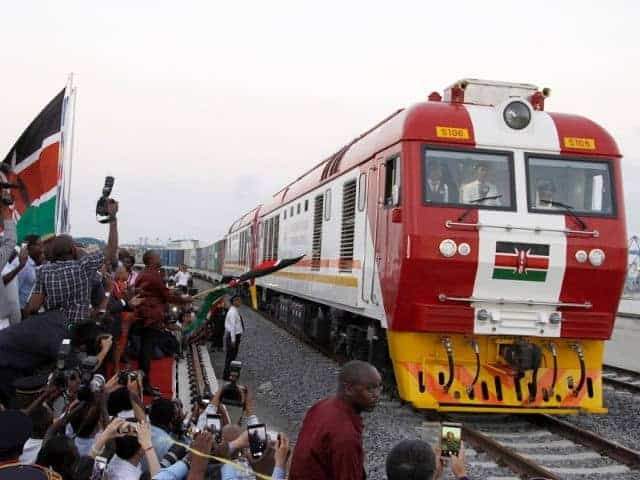Belt and Road: China-Kenya Rail Contract Ruled Illegal

A Kenyan appellate court has declared a $3.2 billion rail contract between Kenya and the China Road and Bridge Corporation (CRBC) illegal, the South China Morning Post (SCMP) reported on Tuesday.
Kenya’s Court of Appeal ruled on Friday that state-owned Kenya Railways had “failed to comply with and violated” the nation’s laws “in the procurement of the SGR [Standard Gauge Railway] project.”
The Law Society of Kenya brought the suit in 2014 arguing that the railway was a public works project that should have been conditional upon a “fair, competitive, and transparent procurement process.” Instead, its attorneysd claimed, the SGR contract was “single-sourced without being put up for tender” with Kenyan taxpayers facing the burden of repaying associated loans. Kenya’s High Court originally dismissed the case. The plaintiffs then appealed this decision, resulting in the appellate court’s ruling on Friday.
According to the report, the appellate court’s ruling leaves many possibilities up in the air. It comes after a large section of the project, roughly two-thirds, was already completed and has been operational. Some observers think that the Kenyan government or CRBC could challenge the appellate court ruling in Kenya’s Supreme Court.
According to the SCMP, Kenya Railways and CRBC have defended their joint contract, claiming the Kenyan government negotiated with the Exim Bank of China for two loans, each estimated at $1.6 billion, to finance the SGR project. China is Kenya’s second-biggest creditor, and the Exim Bank of China is the top recipient of Kenyan interest.
The “contractor negotiated loan” deal described by Kenya Railways and CRBC is an example of corrupt arrangements often seen between China and Kenyan political actors that “make it easy to conspire with the Chinese to push a project into the [Kenyan] government’s spending program even when it has no money for it,” according to Kenyan newspaper Daily Nation.
Kenya’s SGR is part of China’s greater Belt and Road Initiative (BRI) to finance and build infrastructure projects throughout developing nations in Africa, Asia, Europe, and Latin America. Based on predatory loans, the BRI projects serve China more than the host country, which acquires burdensome debts to Beijing. By forcing nations across multiple continents to become increasingly dependent upon China, the BRI allows Beijing to push the Chinese Communist Party’s (CCP) sociopolitical agenda on a global scale.
Last week, Communist Party leader Xi Jinping praised Kenya’s controversial railway project at a virtual China-Africa Summit he hosted for African leaders in Beijing. Xi congratulated Kenyan President Uhuru Kenyatta on the SGR, saying the railway had ensured the “uninterrupted flow of cargo” inland from its starting point at Kenya’s Port of Mombasa. He claimed that Kenya’s SGR had helped “keep trade flowing” in the region despite restrictions placed on freight distribution during the coronavirus pandemic, according to the SCMP.
Xi’s laudatory remarks failed to address the fact that the Kenyan government has been forcing importers to use the SGR in recent months under pressure to pay its debts to China, made even harder by the economic downturn caused by the coronavirus pandemic. Importers have resisted transporting their cargo via the railway, preferring to use less expensive modes of transportation, such as trucks.
As reported by the SCMP, SGR generated $136 million in revenues last year through cargo transport and passenger services. However, this month, Kenya’s parliament revealed that Kenya Railways “had not paid $380 million in management fees to Africa Star Railway [a CRBC subsidiary].” The Chinese Embassy in Nairobi later confirmed the unpaid fees to Africa Star Railway, claiming it “appreciated the efforts that the Kenya government has made to clear the pending payments.” In 2017, Beijing awarded Africa Star Railway a contract to manage the SGR’s cargo and passenger operations, according to the report.
According to the Daily Nation, the SGR contract originally stipulated that Kenya’s Mombasa Port be used as collateral for China’s loan, in a serious threat to Kenyan sovereignty: “As then-Auditor General Edward Ouko said, the government committed Mombasa Port as part of the collateral. So, if the government defaulted on the loan, the port could be taken over,” the newspaper revealed.
China has forced other desperate nations into similar debt traps. In 2017, China seized Sri Lanka’s port after the struggling nation defaulted on its BRI loans.
Photo: Khalil Senosi/AP Photo
Link: https://www.breitbart.com/asia/2020/06/25/belt-and-road-china-kenya-rail-contract-ruled-illegal/











